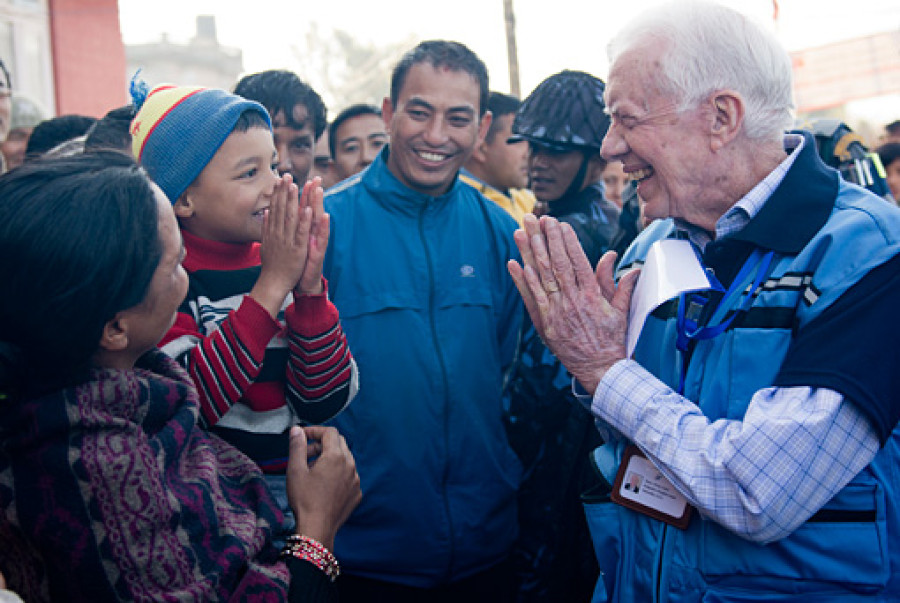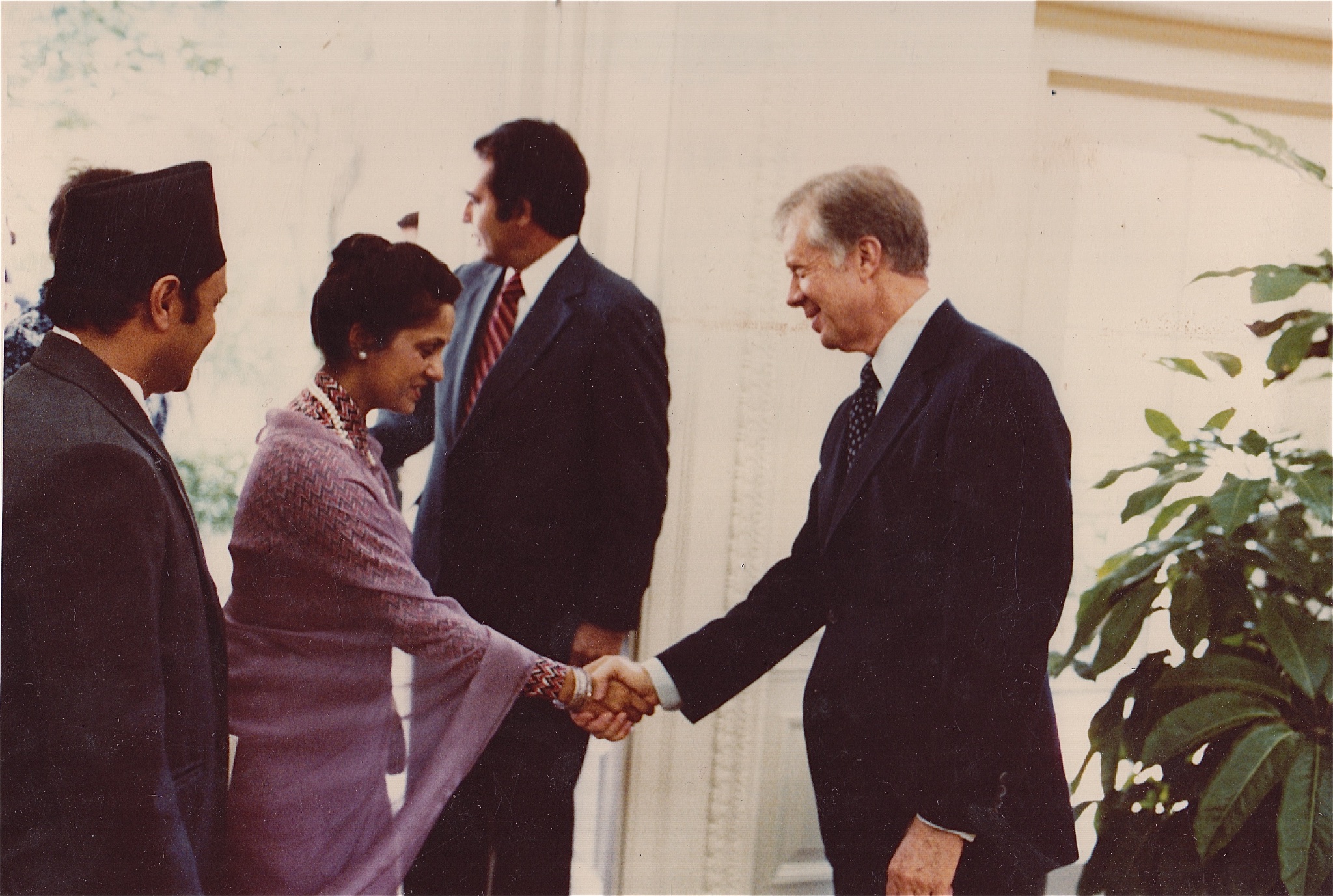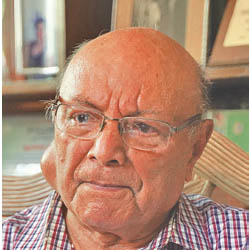Columns
The humanitarian with a heart for Nepal
President Carter was simple, had a deep understanding about global peace and always believed the humanitarian aspect should be prioritised for global peace.
Bhekh Bahadur Thapa
In 1979, King Birendra Bir Bikram Shah requested me to take responsibility as Nepali ambassador to the United States. At the time, Jimmy Carter was the US President. Nepal-US relations were normal even as President Carter had given priority to the issue of human rights. Several countries were struggling to safeguard human rights. President Carter wanted to reinvigorate this issue, which was also his first foreign policy priority.
At that time, Nepal was also in focus due to the agitation by the political parties for the restoration of democracy. Around the same time, Nepal went for a referendum, giving people a choice between multiparty democracy or continuation of the Panchayat system. People voted in favour of an improvised Panchayat system and an agenda of restoration of democracy.
Both the sides, Nepal and the US, were committing to promote the human rights situation in Nepal. The outside world was also convinced that Nepal is giving priority to safeguard human rights even at a time the country was in a political conflict. When King Birendra requested me to be the ambassador of the United States, it was my priority to appraise the Americans about the situation in Nepal as well as how the government of Nepal was dealing with it in a practical way.
Our priority was also to rightly evaluate the economic, social and political situations in Nepal and communicate them to the American side. Likewise, another instruction (probably from the palace) was to tell Americans to look at Nepal through its own eyes, not through the lens of others. Yet another instruction was to prioritise bilateral talks between Nepal and the US and to improve the cold relations between Kathmandu and Washington DC. At that time I was preparing to set up a new organisation with my friends, whereby we wanted to contribute to Nepal’s economic and social development.
I left for the United States with my family after the sudden opportunity offered by the king. After reaching the US, we managed to present credentials. During the presentation of credentials, the ambassador could take his entire family to the White House, which was unique to the US.
The date and time for presenting credentials to the US president was fixed. After presenting my credentials to President Carter, he expressed his views about Nepal. He also spoke with my family members and then we briefly met over the tea reception. President Carter said that the US would strengthen its relations with Nepal and give priority to economic assistance and promotion of human rights.
The time for presenting credentials (envoys from other countries were also there) was one hour. It was clear that the US wanted to strengthen relations with Nepal while playing a very constructive role. During the official and formal programs in DC, it was my impression that US-Nepal ties were cordial with few differences.
During Carter’s tenure, it was widely thought that his presidency would pursue the same policy with big and small nations. But in that first meeting, I found President Carter simple and friendly. He had studied a lot and had interest in Nepal’s northern belt as well as the hilly regions. President Carter had given priority to his own country, America’s closest neighbours and those with which America had strategic ties. In general, he gave priority to American security and economic progress but engagement with the rest of the world was based on different evaluation. For a diplomat, it was rare to have such frank conversation with the US president. During the conversation, he kept talking about wanting to climb Nepal’s mountains and hills.
During Carter’s four years, I contacted some US policymakers, among them Zbigniew Kazimierz Brzeziński who was the National Security Advisor to President Carter (1977 to 1981). We played tennis together and cultivated deep relations. Through his connection, I used to get informed about the US relations and its policy towards the rest of the world. More than bilateral relations, I used to get informed time and again about changing global scenarios, US strategic views and other matters.

Our relationship was smooth. But time and again, US security agencies kept telling us to prioritise democracy in Nepal, not depend on foreign aid and assistance and kept suggesting we focus on internal management. During the four years of President Carter, Nepal-US relations ran smoothly and we did not face any bitter experience.
One day, Carter’s national security advisor told me that at the end of his tenure, President Carter wanted to communicate with the leaders of 20 countries. Accordingly, Carter had a conversation with the Nepali king at the end of his presidency. During his term, one member of the US national security agency had told me that the president and his wife wanted to go to Nepal on a private visit and to trek Nepal's hilly region.
If he makes up his mind, he and his wife will call you one day, the member of the US national security agency told me. The visit will not be a political one and will focus on trekking in Nepal’s hilly region as well in the northern belt, the official told me. If he is interested to visit Nepal, the Nepali Embassy will cooperate, I replied, which would also strengthen bilateral ties and create a good foundation to nurture bilateral relations.
After President Carter retired, he called me to his hometown Atlanta. I arranged my schedule, went to Atlanta and stayed in a hotel near his residence. I stayed there for two days and discussed his visit to Nepal, where he wanted to go and whom he wanted to meet. His priority was Nepal’s northern belt, specifically around Mt Everest, and he wanted to meet the people in that area.
After that meeting, we fixed that his visit would focus in Kathmandu and around Mt Everest. Before meeting me, he had extensively studied Nepal, Mt Everest and the locality. Then we came to Kathmandu and met King Birendra at the royal palace. He had the same perspective on foreign policy and affection towards Nepal, in or out of presidency. He was the only former US president to visit Nepal.
In my understanding, President Carter was simple, had a deep understanding about global peace and always believed the humanitarian aspect should be prioritised for global peace. He was of the view that the Cold War should not be continued and strategic interest should not harm the humanitarian cause.
He always said that world peace should not be disturbed by strategic rivalry and the humanitarian aspect should be prioritised. In the end, I would like to pay tribute to a person who throughout his 100 years of life lived positively and always worked in favour of peace and progress.




 13.12°C Kathmandu
13.12°C Kathmandu















